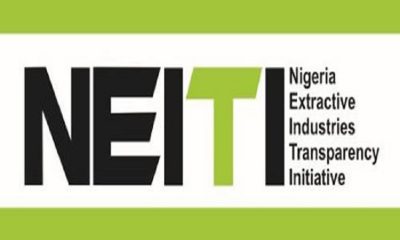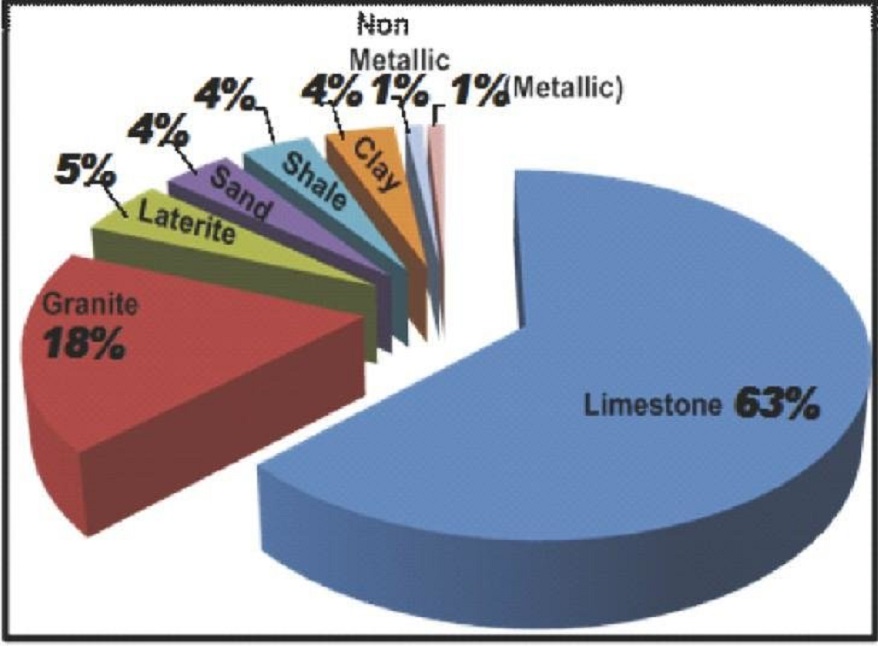Economy
FG Earned N69b from Solid Minerals in 2015 Buoyed by Cement

By Modupe Gbadeyanka
A new report released by the Nigerian Extractive Industries Transparency Initiative (NEITI) has revealed that a total of N69.20 billion was generated from the solid minerals industry in 2015.
NEITI, in the 2015 Mineral Audit Report, explained that this figure was against N55.81 billion made earlier from the sector, which represented 23.98 percent increase.
The agency said in the report that the value of solid minerals exports in 2015 stood at $9.733 million, which was 1.45 percent of non-oil exports for the year.
It noted that Lead and Zinc topped the chart with 79 percent valued at $7.7 million, while 175 ounces of gold valued at $122,000 were exported during the period.
NEITI, which released the report on Sunday after its approval by the National Stakeholders Working Group, which is the board of NEITI, revealed that the solid minerals sector contributed 0.12 percent to Nigeria’s Gross Domestic Product (GDP) in 2015, a marginal increase of 0.01 percent on the 0.11 percent contribution of the sector to GDP in 2014.
The audit report further disclosed that the total production of solid minerals in the country stood at 39.27 million tons.
This, it stressed, represents a reduction of 17 percent from the 47.1 million tons produced in 2014.
The drop in 2015’s production was attributed to insecurity in parts of the country and more stringent approval process for explosives used in mining.
However, while mineral production reduced, government revenues went up in the same year.
“This increase in revenue was due to the growth in taxes collected from the sector and review of royalty rates paid by companies which came into effect within the year under review,” the report stated.
NEITI’s previous solid minerals audit reports had recommended upward review of Nigeria’s royalty rates to align with prevailing industry and present day realities.
“This report shows evidence that the contribution of the solid minerals sector to government revenues and macro-economic indicators is beginning to improve, even if marginally,” said Waziri Adio, NEITI’s Executive Secretary. “The sector could definitely contribute more to revenues, job and wealth creation, exports, imports substitution, industrial development and overall national growth.”
“But there is a sign of progress already,” Adio added. “What we need to do is to build on, deepen and sustain this early promise to ensure that the country returns to being a major mining destination and maximizes the abundant opportunities offered by the sector”.
“Faithful and sustained implementation of the roadmap developed by the Ministry of Mines and Steel Development and of the recommendations in this report will be necessary.”
The report highlighted the specific contributions by companies and states to the sector revenue growth and development.
“Cement manufacturing companies were the major revenue contributors to the sector, accounting for over 60 percent, while construction companies and real mining companies contribute about 31 percent and 8% respectively.
For instance, three states- Ogun, Kogi and Cross River and the FCT accounted for about 70 percent of the production volumes in 2015. However, Ogun state topped the table with 36 percent.”
According to the report, a total of 4,305 mineral titles were valid in 2015. It was learnt that 204 were mining leases, 657 were for small scale mining, 1,865 were for quarrying licenses while exploration licenses accounted for the remaining 1579.
It noted that 1,220 of the 4,305 mining titles were issued in 2015 alone.
Mr Adio, the NEITI Executive Secretary, disclosed that the NEITI 2015 Oil and Gas report will be released next month. He also reaffirmed the commitment of the Board to ensuring that its reports are more timely.
He said “resources and processes permitting, NEITI plans to clear the backlog of reports by the middle of 2018. Our goal is not just to make our reports more timely but also to make them as real-time as possible to enhance their utility and relevance.”
“We are finalizing the procurement process of the 2016 reports and will soon commence the procurement for the 2017 reports. We are also working hard to automate our data collection and to mainstream the EITI process”.
“Once we achieve this, we hope to then concentrate more on adding extra value to the country through cutting-edge analyses, modelling and forecasting, and setting agenda for more prudent and accountable application of natural resources for the benefits of all Nigerians,” Mr Adio stated.
The just released 2015 solid minerals audit report recognized the progress being made by the government towards repositioning the sector to be a major driver of the economic and revenue diversification agenda of the present administration.
To sustain this growth and further enhance the capacity of the sector to contribute to the economy, the report called for “the speedy release of the N30 billion solid minerals development fund recently approved by the Federal Executive Council to the intended beneficiaries in order to support some of the activities already stipulated in the Roadmap for the sector”.
The report also called for the improvement of the economic value of Nigeria’s minerals across the value chain before export in order to maximize their potentials and contributions to the growth of the Nigerian economy, while a ban should be placed on the importation of some minerals like gypsum, barite and kaolin which Nigeria has in good quality and quantity.
As part of measures to curb the activities of illegal miners resulting in loss of revenues to government and ensure the security of field officers, the NEITI report recommended the “re-introduction of mines police to protect the officers, reduce the activities of illegal miners and subsequently increase production and investments in the sector. Government should also build the capacity and equip the states’ mines officers and surveillance teams so they can effectively verify production figures and accurately calculate royalty payments.”
The report underscored the need for synergy between relevant government agencies to ensure that all minerals export including samples have permits duly issued by the Mining Inspectorate Department while urgent measures should be taken by government to curb multiple taxation in the sector in line with its policy on Ease of Doing Business in the country.
NEITI’s first intervention in the solid minerals sector began with the conduct of a scoping study in 2011, followed by an independent audit of the sector in 2012 which covered the years 2007-2010.
The six cycles of audit so far conducted by NEITI in the sector show that Nigeria earned a total of N271.77billion from 2007 to 2015.
The NEITI 2015 solid minerals audit was conducted by Amedu Onekpe & Co, a Nigerian audit firm selected through international competitive procurement process.
The audit covered 481 companies that made royalty payments in that year. The process specifically reconciled the payments made by 42 companies to government receipts. These 42 companies met the materiality threshold of N3million royalty payment set by NEITI which accounted for about 87 percent of the total royalty payments made in the sector, NEITI said.
The report also has comprehensive information on financial flows in the sector, governance and process issues and the implications for revenues tracking, computation and management, it added.
Economy
FG Targets Credit Access For 50% Workers By 2030

By Adedapo Adesanya
The Vice President, Mr Kashim Shettima, inaugurated the Board of the Nigerian Consumer Credit Corporation (CREDICORP) and gave a 50 per cent access target for workers, saying consumer credit was critical to Nigeria’s ambition of becoming a one-trillion-dollar economy by 2030.
According to him, President Bola Tinubu established the CREDICORP to build a trusted credit infrastructure, provide catalytic capital to lower borrowing costs, and help Nigerians overcome long-standing cultural resistance to credit.
Speaking on Thursday in Abuja when he inaugurated the board on behalf of the President, the Vice President, in a statement by his spokesman, Mr Stanley Nkwocha, said that the quality of life of Nigerians cannot improve without closing the gap between access to capital and human dignity.
“A civil servant who earns honestly does not have to chase sudden wealth just to buy a vehicle, or save for ten years to buy one. A young professional should not remain in darkness simply because solar power must be paid for all at once,” the Vice President said.
VP Shettima disclosed that in just one year of operations, CREDICORP has disbursed over ₦37 billion in consumer credit to more than 200,000 Nigerians, with over half of them accessing formal credit for the first time.
The Vice President said the organisation was specifically tasked with building credit infrastructure to bridge the trust gap between lenders and borrowers, providing wholesale capital and credit guarantees through its portfolio company.
“Ultimately, these critical jobs of CREDICORP will enable access to consumer credit to at least 50 per cent of working Nigerians by 2030,” he said.
The Vice President explained that the new board’s role was not ceremonial as they are custodians of the organisation’s mission, adding that the long-term strength of the institution would depend on their “vigilance, integrity, sacrifice, and commitment.”
He directed Board members to uphold Public Service Rules, the Board Charter, and all applicable governance frameworks, warning that accountability and stewardship of public resources were non-negotiable.
The Chairman of CREDICORP, Mr Aderemi Abdul, expressed appreciation to President Tinubu for his vision behind the formation of CREDICORP and for the confidence reposed in them, noting that the establishment of the corporation marked an important step towards strengthening the nation’s financial architecture.
He assured President Tinubu that the board understands its responsibility and will guide the institution to deliver meaningful benefits to Nigerians.
For his part, Mr Uzoma Nwagba, Managing Director/CEO of CREDICORP, recalled watching President Tinubu say 20 years ago that consumer credit is one of the major tools that will improve the lives of Nigerians.
He noted that over the past 18 months, the institution has benefited more than 200,000 Nigerians, including students.
He assured that the presidential vision behind CREDICORP would not be taken lightly, as the team considers their appointments a unique, once-in-a-lifetime opportunity.
Other members of the board inaugurated include Mrs Olanike Kolawole, Executive Director, Operations; Mrs Aisha Abdullahi, Executive Director, Credit and Portfolio Management; Mr Armstrong Ume-Takang (MD, MoFI), Representative of MoFI; Mrs Bisoye Coke-Odusote (DG, NIMC), Representative of NIMC; and Mr Mohammed Naziru Abbas, Representative of FMITI.
Others are Mr Marvin Nadah, Representative of FCCPC; Mrs Chinonyelum Ndidi, Representative of the Federal Ministry of Finance; Mr Mohammed Abbas Jega, Independent Director; and Mrs Toyin Adeniji, Independent Director.
Economy
NASD OTC Exchange Rallies 0.23% as Nipco Leads Six Advancers

By Adedapo Adesanya
Six price gainers helped the NASD Over-the-Counter (OTC) Securities Exchange retain its stay in green territory after a 0.23 per cent appreciation on Thursday, February 26.
The price gainers were led by Nipco Plc, which added N25.00 to close at N278.00 per share compared with the previous day’s N253.00 per share, NASD Plc rose by N5.13 to N56.41 per unit versus N51.28 per unit, FrieslandCampina Wamco Nigeria Plc expanded by N2.24 to N102.44 per share from N100.00 per share, Afriland Properties Plc grew by 88 Kobo to N18.88 per unit from N18.00 per unit, 11 Plc increased by 35 Kobo to N277.00 per share from N276.65 per share, and Lagos Building Investment Company (LBIC) Plc gained 27 Kobo to close at N3.75 per unit versus N3.48 per unit.
On the flip side, Central Securities Clearing System (CSCS) Plc lost N1.75 to sell at N68.25 per share versus N70.00 per share, and Geo-Fluids Plc depreciated by 2 Kobo to N3.25 per unit from N3.27 per unit.
The weight of the advancers fortified the NASD Unlisted Security Index (NSI) by 9.21 points to 4,034.46 points from 4,025.25 points, and the market capitalisation soared by N5.51 billion to N2.413 trillion from Wednesday’s N2.408 trillion.
Yesterday, the transaction value jumped by 18.8 per cent to N102.8 million from N80.7 million, and the number of deals surged by 18,8 per cent to 38 deals from 32 deals, while the transaction volume went down by 84.9 per cent to 1.3 million units from 8.7 million units.
At the close of business, CSCS Plc was the most traded stock by value (year-to-date) with 34.2 million units worth N2.04 billion, followed by Okitipupa Plc with 6.3 million units sold for N1.1 billion, and Geo-Fluids Plc with 122.1 million units valued at N478.2 million.
Resourcery Plc remained as the most traded stock by volume (year-to-date) with 1.05 billion units exchanged for N408.7 million, trailed by Geo-Fluids Plc with 122.1 million worth N478.2 million, and CSCS Plc with 34.2 million units traded for N2.04 billion.
Economy
Naira Down Again at NAFEX, Trades N1,359/$1

By Adedapo Adesanya
The Naira further weakened against the Dollar in the Nigerian Autonomous Foreign Exchange Market (NAFEX) for the fourth straight session this week on Thursday, February 26.
At the official market yesterday, the Nigerian Naira lost N3.71 or 0.27 per cent to trade at N1,359.82/$1 compared with the previous session’s N1,356.11/$1.
In the same vein, the local currency depreciated against the Pound Sterling in the same market window on Thursday by N8.27 to close at N1,843.23/£1 versus Wednesday’s closing price of N1,834.96/£1, and against the Euro, it crashed by N8.30 to quote at N1,606.89/€1, in contrast to the midweek’s closing price of N1,598.59/€1.
But at the GTBank forex desk, the exchange rate of the Naira to the Dollar remained unchanged at N1,367/$1, and also at the parallel market, it maintained stability at N1,365/$1.
The continuation of the decline of the Nigerian currency is attributed to a surge in foreign payments that have outpaced the available Dollars in the FX market.
In a move to address the ongoing shortfall at the official window, the Central Bank of Nigeria (CBN) intervened by selling $100 million to banks and dealers on Tuesday.
However, the FX support failed to reverse the trend, though analysts see no cause for alarm, given that the authority recently mopped up foreign currency to achieve balance and it is still within the expected trading range of N1,350 and N1,450/$1.
As for the cryptocurrency market, major tokens posted losses over the last 24 hours as traders continued to de-risk alongside equities following Nvidia’s earnings-driven pullback, with Ripple (XRP) down by 2.7 per cent to $1.40, and Dogecoin (DOGE) down by 1.6 per cent to $0.0098.
Further, Litecoin (LTC) declined by 1.3 per cent to $55.87, Ethereum (ETH) slipped by 0.9 per cent to $2,036.89, Bitcoin (BTC) tumbled by 0.7 per cent to $67,708.21, Cardano (ADA) slumped by 0.6 per cent to $0.2924, and Solana (SOL) depreciated by 0.4 per cent to $87.22, while Binance Coin (BNB) gained 0.4 per cent to sell for $629.95, with the US Dollar Tether (USDT) and the US Dollar Coin (USDC) closing flat at $1.00 each.
-

 Feature/OPED6 years ago
Feature/OPED6 years agoDavos was Different this year
-
Travel/Tourism10 years ago
Lagos Seals Western Lodge Hotel In Ikorodu
-

 Showbiz3 years ago
Showbiz3 years agoEstranged Lover Releases Videos of Empress Njamah Bathing
-

 Banking8 years ago
Banking8 years agoSort Codes of GTBank Branches in Nigeria
-

 Economy3 years ago
Economy3 years agoSubsidy Removal: CNG at N130 Per Litre Cheaper Than Petrol—IPMAN
-

 Banking3 years ago
Banking3 years agoSort Codes of UBA Branches in Nigeria
-

 Banking3 years ago
Banking3 years agoFirst Bank Announces Planned Downtime
-

 Sports3 years ago
Sports3 years agoHighest Paid Nigerian Footballer – How Much Do Nigerian Footballers Earn



















